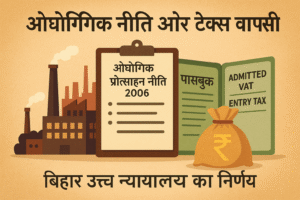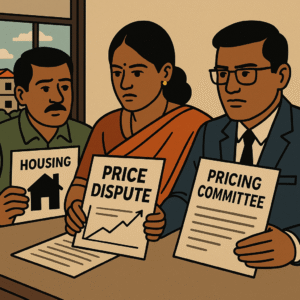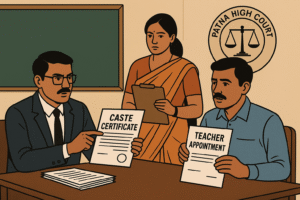The Patna High Court Division Bench has allowed a Letters Patent Appeal (LPA No. 704 of 2024) filed by the Bihar Public Service Commission (BPSC), overturning a Single Judge’s order that had directed constitution of a new five-member expert committee from IIT Patna and NIT Patna to find definitive answers to four questions in Set ‘B’ of an OMR-based test for recruitment of Assistant Professors (Physics). The Division Bench held that such a direction effectively amounted to impermissible re-evaluation in the absence of any statutory rule or notification providing for it, and permitted the Commission to proceed with the selection and appointment process.
The appeal arose from a writ petition where the petitioner (a candidate) had challenged the correctness of certain answers in the Physics OMR test conducted pursuant to Advertisement No. 63/2020 for appointment of Assistant Professors in Government Engineering Colleges in Bihar. The Single Judge had directed a fresh expert committee (from IIT/NIT) to fix final answers to four disputed questions in Set ‘B,’ and to then consider only the petitioner’s case for revision of marks and interview eligibility, with a provision that the committee’s majority view would prevail in case of disagreement. The Division Bench found this approach legally unsustainable.
Simplified Explanation of the Judgment
The central dispute concerned the method of addressing alleged errors in the answer key of an OMR-based screening test for Assistant Professor (Physics) recruitment. The recruitment process had multiple components: (i) an objective test carrying 40 marks; (ii) assessment of academic record and research performance carrying 20 marks; (iii) weightage for contract Assistant Professors carrying up to 25 marks; and (iv) an interview carrying 15 marks. Importantly, only candidates securing the minimum qualifying marks in the OMR test could be called for interview. The writ petitioner did not meet the qualifying standard in the OMR test and therefore was not called for interview; only the OMR evaluation was under challenge.
Before publication of final results, the Commission followed a multi-stage process to improve the accuracy of the answer key. First, it published a provisional answer key on 12.11.2022 and invited objections. The petitioner filed objections on 17.11.2022. A five-member expert committee met on 05.01.2023 and, after considering objections, changed the options for eight questions and deleted two questions where none of the given options was correct. A revised provisional key issued thereafter again drew objections. The Commission afforded an unusual level of participation: objecting candidates were called for personal hearing at the Commission office and were allowed to interact with experts telephonically to present their views. Subsequently, in minutes dated 21.01.2023, the committee deleted four questions and changed the options for another four. A further meeting on 10.02.2023 re-evaluated all 80 questions and led to yet another provisional key. Finally, a revised final answer key was published; the petitioner again represented and then approached the High Court.
On appeal, senior counsel for the Commission argued that the Single Judge’s direction effectively ordered re-evaluation, which is not permissible unless expressly provided by statute, rules, or the recruitment notification. Counsel emphasized that the Commission had already constituted expert teams repeatedly to test objections and refine the key, and that the process had progressed to interview stage, with the writ petitioner not qualifying for interview.
The petitioner’s counsel countered that frequent corrections by the expert committee themselves showed uncertainty regarding correct answers. He relied on decisions that protect candidates from erroneous answer keys and stress that merit should not suffer because of mistakes by paper setters or evaluators.
The Division Bench restated governing principles from the Supreme Court’s decision in Ran Vijay Singh v. State of Uttar Pradesh (2018) 2 SCC 357. In summary: (i) if rules permit re-evaluation, it may be allowed; (ii) if not, courts may still permit it only in rare or exceptional cases where a material error is clearly demonstrated without inferential reasoning; (iii) courts should not themselves re-evaluate; (iv) the key answers carry a presumption of correctness; and (v) in case of doubt, benefit goes to the examining authority, not to the candidate. These guardrails are meant to prevent courts from entering academic domains except in exceptional circumstances.
Applying these principles, the Bench noted that the Commission had, not once but four times, placed provisional keys in the public domain, invited objections, heard candidates, and revised/deleted answers where justified. The membership of the expert committee overlapped across the rounds, but this by itself did not demonstrate bias or unfairness; rather, the committee’s willingness to correct itself reflected fairness and diligence. In one instance, an expert even heard objectors personally over telephone, further strengthening the transparency of the exercise. On these facts, the Court found no “rare or exceptional” circumstance warranting court-ordered re-evaluation by a fresh external body.
The Bench also flagged an additional legal flaw: the Single Judge had directed re-evaluation limited to the petitioner’s answer paper. If re-evaluation is to be ordered at all, it cannot be confined to a single candidate when the examination is common; selective re-evaluation undermines fairness to the entire cohort. Given that neither the advertisement nor any rule provided for re-evaluation, the court could not carve out a candidate-specific exception absent clear proof of material error. The Bench therefore set aside the Single Judge’s judgment and allowed the Commission to proceed with selection and appointment.
In essence, the Division Bench balanced two competing considerations: protecting candidates from incorrect answer keys and preserving the integrity and finality of large-scale recruitment assessments. Here, the Commission’s extensive multi-round review process, public objections, and corrections substantiated that adequate safeguards were deployed. The petitioner’s claim did not cross the high threshold necessary to justify a court-directed re-evaluation by a new expert body. The appeal was allowed; interlocutory applications, if any, were closed.
Significance or Implication of the Judgment (For general public or government)
- For examining bodies: The decision reaffirms that when an examining authority establishes an open, iterative objection mechanism with expert scrutiny and genuine corrections, courts will be slow to intervene. It underscores the importance of transparent objection handling and reasoned revisions to the answer key.
- For candidates: While courts will protect merit where a material error is clearly shown, selective re-evaluation for a single candidate is disfavoured. Candidates must demonstrate a rare or exceptional error that is evident on the face of the record, not one requiring speculation.
- For policymakers: Recruitment notifications should clearly address if and how re-evaluation will be handled. A well-drafted, multi-stage objection process reduces litigation risk and protects the legitimacy of results.
Legal Issue(s) Decided and the Court’s Decision with reasoning
- Whether a court can direct re-evaluation by a fresh expert committee when rules/notification do not provide for it.
Decision: No, except in rare or exceptional cases where a material error is clearly demonstrated without inferential reasoning; here, that threshold was not met. Reasoning: Ran Vijay Singh principles; presumption of correctness of key; examining authority’s comprehensive multi-round review with corrections and candidate hearings. - Whether re-evaluation limited to one candidate is permissible.
Decision: Impermissible. If re-evaluation is ordered, it cannot be confined to a single candidate in a common examination. Reasoning: Ensures equality and fairness across the cohort; no enabling provision existed; the Single Judge’s direction was therefore set aside. - Whether the Commission’s process was fair.
Decision: Yes. Reasoning: Four rounds of objections and expert review; changes and deletions where warranted; personal hearing/telephonic interaction with experts for objectors; publication of revised provisional keys culminating in a final key.
Judgments Referred by Parties
- Rajesh Kumar v. State of Bihar, (2013) 3 SCC 690.
- Manish Ujwal v. Maharishi Dayanand Saraswati University, (2005) 13 SCC 744.
- Guru Nanak Dev University v. Saumil Garg, (2005) 13 SCC 749.
- Rishal v. Rajasthan Public Service Commission, (2018) 8 SCC 81.
- Ran Vijay Singh v. State of Uttar Pradesh, (2018) 2 SCC 357.
- Division Bench in Ashish Ranjan v. State of Bihar & Ors., CWJC No. 14828 of 2023, decided 12.03.2024.
Judgments Relied Upon or Cited by Court
- Ran Vijay Singh v. State of Uttar Pradesh, (2018) 2 SCC 357 (principles on re-evaluation).
- Rajesh Kumar v. State of Bihar, (2013) 3 SCC 690 (distinguished on facts; large-scale errors warranted relief there).
Case Title
The Bihar Public Service Commission through the Secretary, Vs. Dr. Eena Bahan
Case Number
Letters Patent Appeal No. 704 of 2024 in CWJC No. 5217 of 2023.
Citation(s)
2025 (1) PLJR 583
Coram and Names of Judges
Hon’ble The Chief Justice (K. Vinod Chandran) and Hon’ble Mr. Justice Nani Tagia.
Names of Advocates and who they appeared for
- Mr. P.K. Shahi, A.G. — for the Appellants (Commission).
- Mr. Vikash Kumar, Advocate — for the Appellants (Commission).
- Mr. Kumar Kaushik, Advocate — for Respondent No. 1 (writ petitioner).
- Government Pleader 5 — for the State respondents.
Link to Judgment
MyM3MDQjMjAyNCMxI04=-k7MXBdLw8mA=
If you found this explanation helpful and wish to stay informed about how legal developments may affect your rights in Bihar, you may consider following Samvida Law Associates for more updates.








